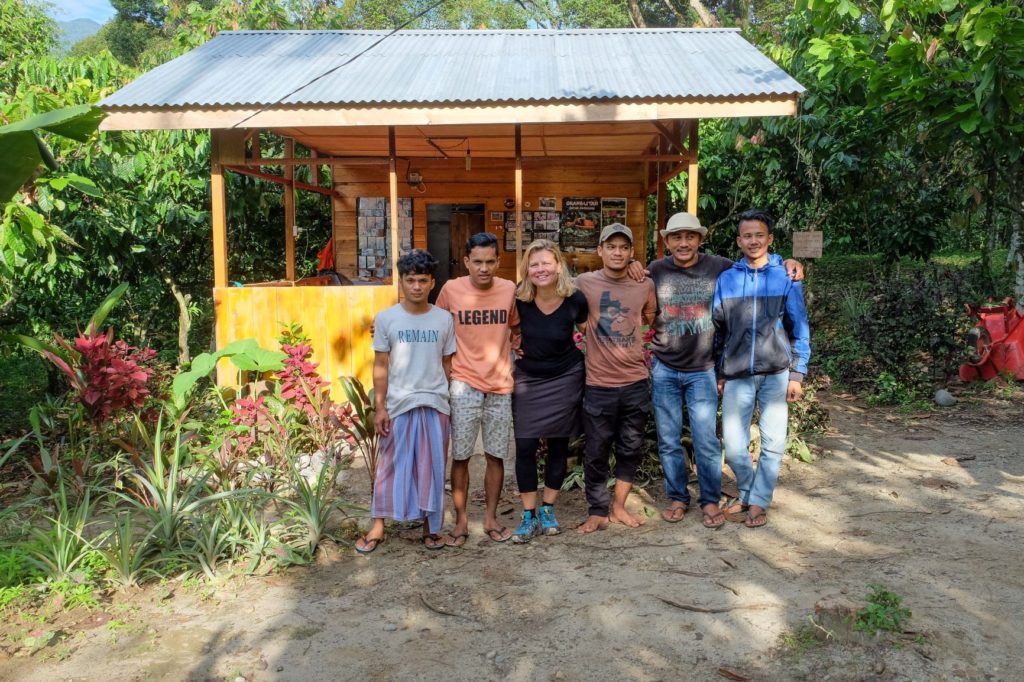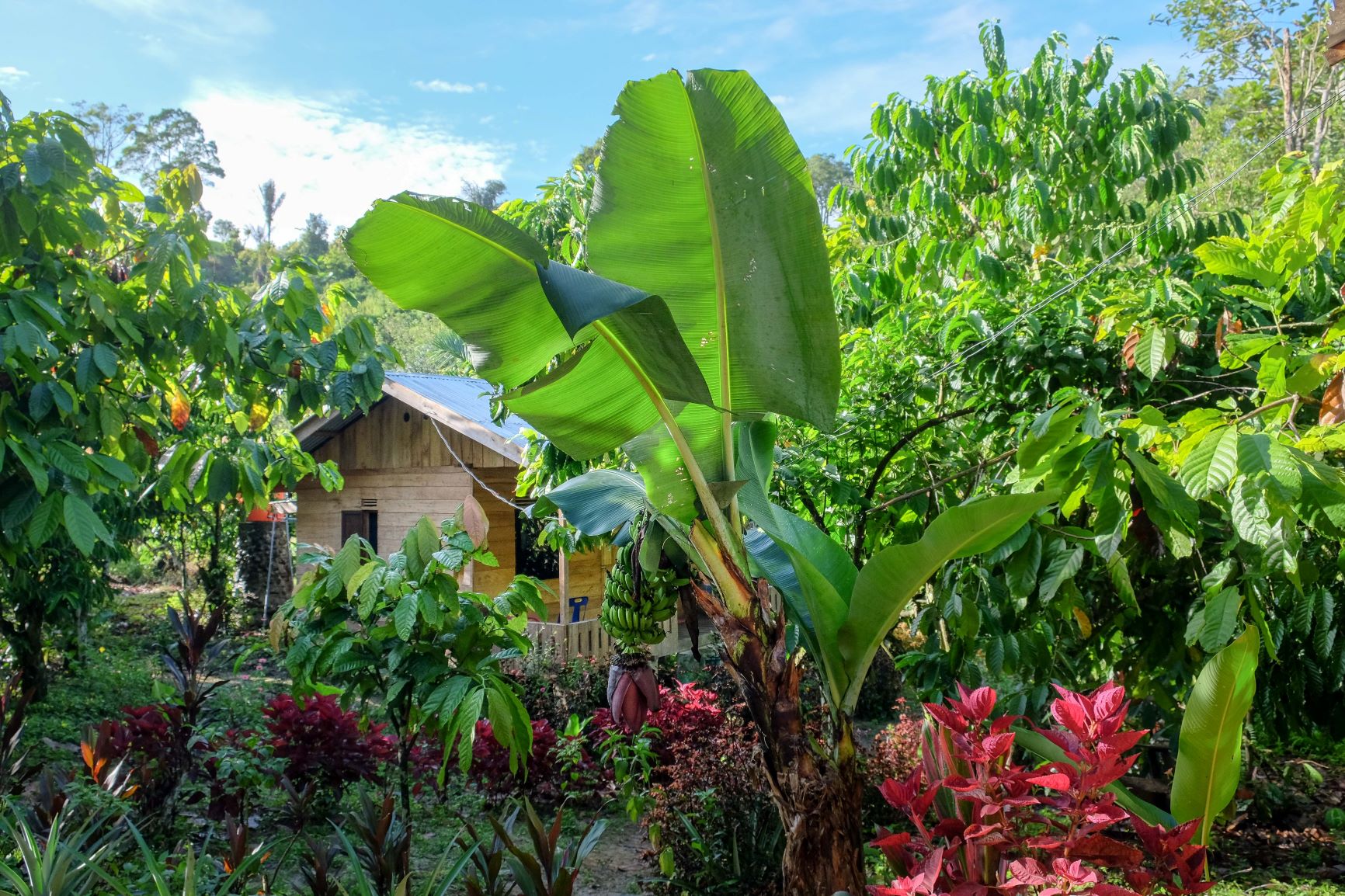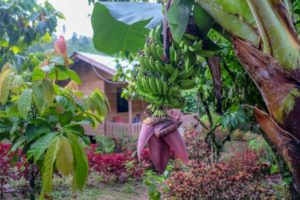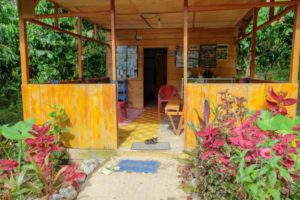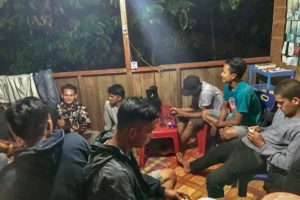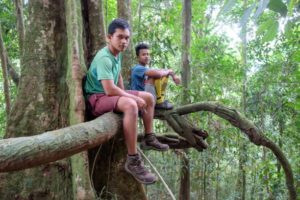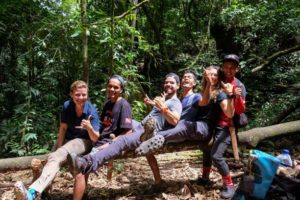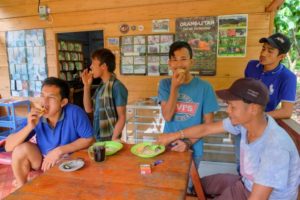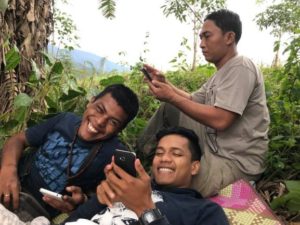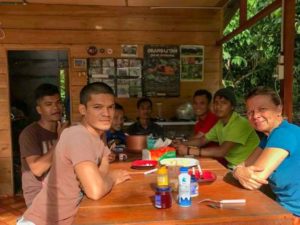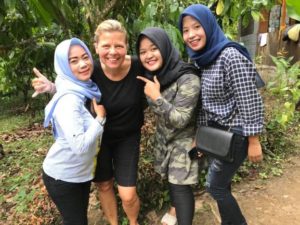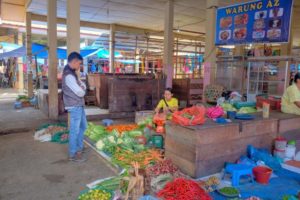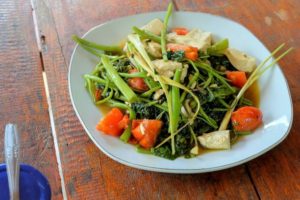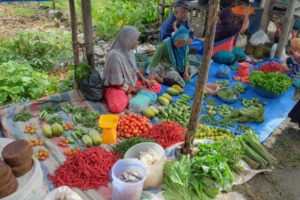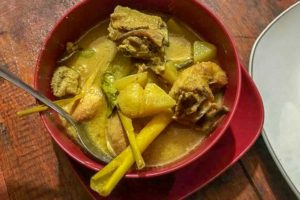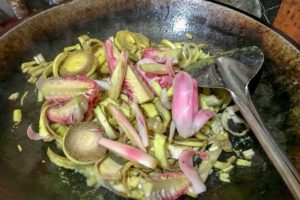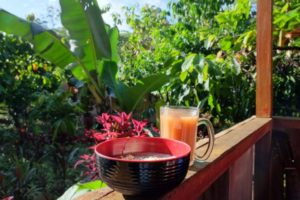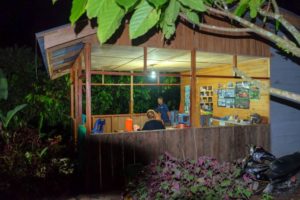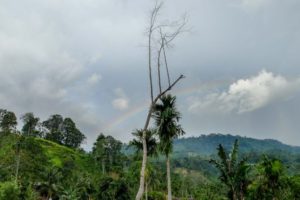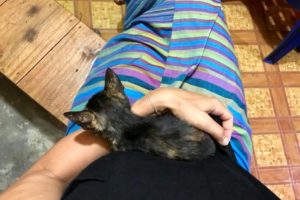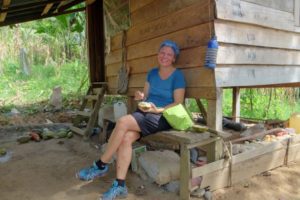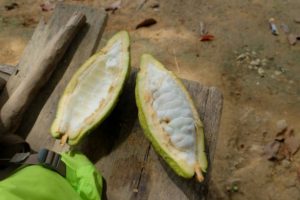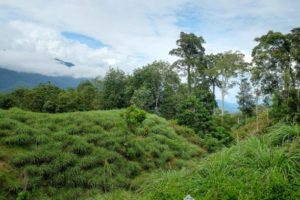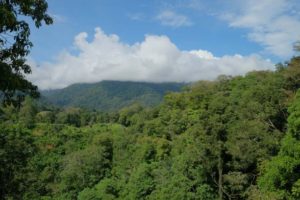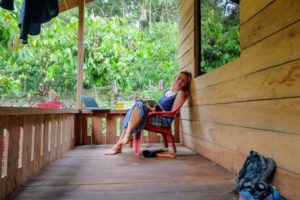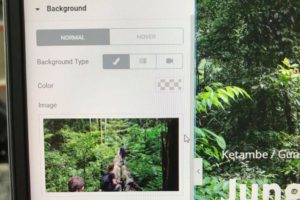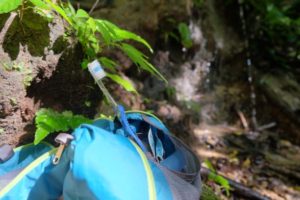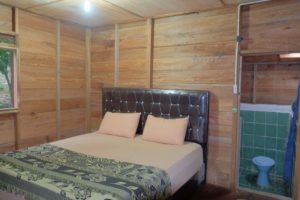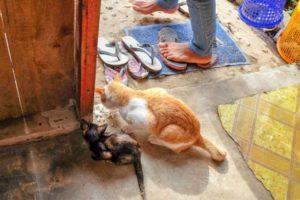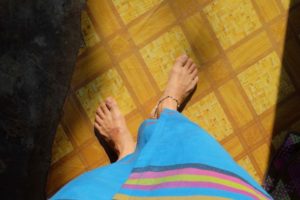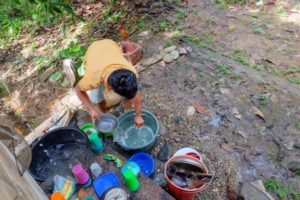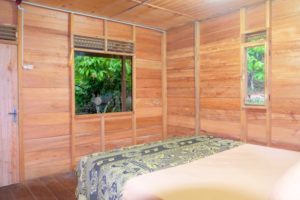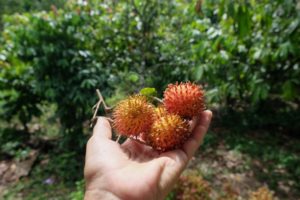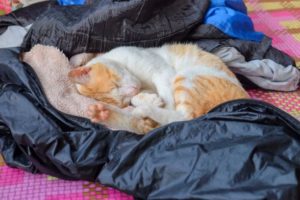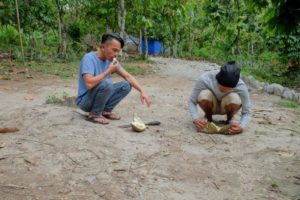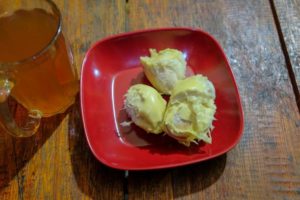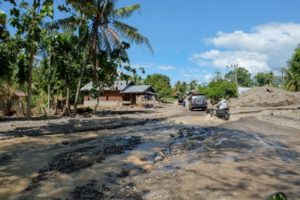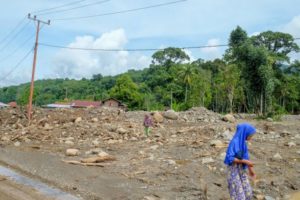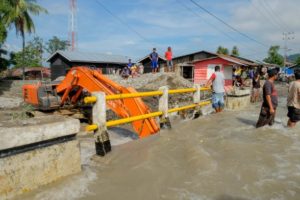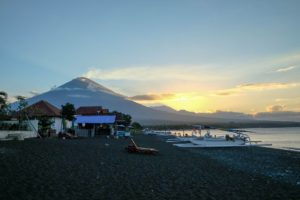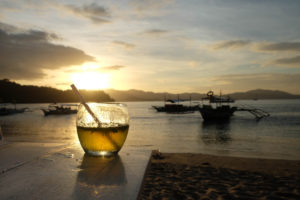After 4 months of roaming around, it was time to switch gears: time to get serious about my ambition to travel AND learn, and time to play the option of returning to some special places for a second time.
Beginning of November, I checked in for a second round with a friend in Yogyakarta. Michaela, originally from Salzburg, is teaching German language at the university in Yogya – a new, and precious friendship with a wonderfully creative and active woman, who I stumbled across in Sumatra. I loved sharing some days of ‘daily life’ with her in her beautiful garden on the foot of Merapi volcano. Apart from socializing a lot in the expat community in Yogya, we also spent many evenings contemplating and laughing about our experiences in Indonesia – deliberately from the perspective of two Austrian women in touch with a very different culture. Happy time. Rejoicing. Easy.
But that’s not the kind of returns I mean here. I mean returning to places outside of my cultural comfort zone, that necessitate to get involved in a local context.
I was aware that returning to a place is very much different from visiting it for a first time. It serves other needs, touches other topics and raises different questions. First it needs some motif clarification: WHY? Why do I go especially there for a second time? There are places, which have a special kind of magic, which felt just right. YES, it’s a risk going there again: does the first impression hold true? Will it remain? Will there be something else? In any case, there will be something NEW. But you also render yourself vulnerable to be disappointed, disillusioned, to be quite simply and brutally brought back down to earth again.
On November 30, 2018, I was flying from Kuala Lumpur to Medan / Sumatra to return to the rainforest and a small village called Ketambe for a second – and potentially longer – time after my first stay there in August. (The Jungle of my Childhood Dreams)
My baseline was to go there: for another jungle trek in a new area, to use the quiet village as a place to learn, to check feasibility for a seminary work in Health Promotion, and to help Putra, the owner of my guesthouse, to set up his new website.
From client to ….?
We were travelling by car for many hours from Medan via Berastagi to finally reach Ketambe. After Kutacane the landscape changes, soft hills with forests are rolling in from both sides of the Alas river, we pass through small idyllic villages. Because the main road was blocked due to flooding, we needed to take a long detour, before finally arriving at the Orangutan guesthouse late in the evening. I know this place! I said to Putra with a big grin on my face.
As long as you are travelling from one place to another, your status is easily defined: you are guest, tourist, paying client – and the rules of the game are defined by universal conventions of travelling. Despite all differences between backpackers and all-inclusive tourists the basic principle remains the same: you pay for services.
This quickly changed now that I am here for the second time. Being the only guest here, I did not order my meals from the menu anymore as of day 2. Especially not, when we go shopping together for veggies, fruits, fish and tofu in town. There comes a point, where you cook together, you eat what everybody else is eating. There comes a point, where I decided to pay for the groceries, but not for my individual meals anymore. And here at the latest comes the ….
… first cultural learning: Sharing is caring
In this small place everything is shared with everyone without even thinking about it. I had bought a 5-pack of Yakult for me, which I prophylactically drink every now and then. When I opened the fridge the next morning, the remaining 4 portions were gone. Everyone was happy to find something that is normally not in stock. Same with “my” soy milk or other rare and interesting items. I have no problem at all to share things, but I realized that I was just not used to this automatism. My early learning was thus to consequently buy two or three times as much the next time – to allow everyone to help themselves.
It is important to understand, that Orangutan guesthouse is a special place. The newly built guesthouse itself is a wooden bungalow with 2 rooms. There is a gazebo, which is called “restaurant”, with an adjacent kitchen. In fact, besides being a guesthouse it is more of a classical shared home and new social hotspot for – not only – the youngsters of the village. And the restaurant is the place were both worlds meet.
People are continuously dropping in, staying from a few minutes to many hours, and if it gets late, mats are laid out on the floor or hammocks hung out between cacao trees in the garden or the wooden pillars of the small gazebo. On a regular night 2 to 5 other persons were sleeping somewhere around the guesthouse, in addition to the Ketambe family brothers (Karim, Putra, Jemana and Armada), who were either sleeping here or in their parents’ place or God knows where. Some of the friends are working here as well, in an organizational setup that is not fully clear to me – they cook, meticulously clean the house, wash the dishes, work in the garden, do the rooms, wash the laundry and care about guests. And like magic there is always someone here, at least 1 person, including the parents every now and then, who were working in the huge garden. During the whole time I spent here, there were maybe only 2 hours, where I was all by myself.
When I say everything is shared with everyone, I mean it. Orangutan guesthouse is also the home of the shared nail clipping device. It was lying around between loudspeakers, ashtrays, folders and tissues, and whoever needed to do his manicure, used it. Mostly on the table. Haha, great!
One of the first and continuous things that needs clarification is: In which kind of social relationship am I with these people?
Ketambe is a small village and Sumatra is like South Burgenland in this respect. People talk, observe, and curiously notice.
We are here in Aceh Tenggara, a – let’s say – officially relatively conservative Islamic area. Most people belong to the Gayo tribe, and this might be even more important as a cultural context. They speak a distinct Gayo language, which is completely different from Bahasa Indonesia. There are lots of songs and traditional dances, which are not dusty relicts, but a proudly lived culture, even among young people. Probably 40% of all the songs, that were played up and down via various smartphones in the guesthouse, were Gayo.
The first thing to clarify is: are you still a client, a tourist? Or are you already a friend? Are you something in between, and if yes – what? How do I define the relationship to the main proponents, but also to the other members of the large family and network?
My impression was, that there exists no such a thing as friendship between a woman and a man in a classical European understanding. But, wait….this is already among the rarer constellations in the Western world! There are still a lot of people, who even doubt that this can exist. Here in Sumatra, in Aceh this might be something completely exotic and strange. Yet, my relationship to my main humans in Ketambe is defined as something of best friends. Great, at least it is clarified that I am not a client anymore.
The next cultural firecracker: What is friendship?
But what is friendship? What does it mean between Western people, between people living in the same cultural context? Already this is hard to define – my personal definition has always been “Friendship is love without wings”. And love (and thus also friendship) to me is basically the decision that you LIKE someone who is special to you and stand with this human being – no matter what, no preconditions, JUST SO. In a Western notion: providing a huge space, where you can also experiment with your self-conception, without the constant need to prove yourself. It means: I will stand by you, I will be there, you are OK just as you are. You can tell the truth, the whole story. Rare and precious.
A true friend has a lot of credit with me. Of course, there are healthy borderlines – for me these are: don’t lie to me, never ever. And wherever my ability to be an integer, healthy individual on any level would be seriously impacted by adhering to someone that is not good for me anymore.
Friendships can go through good and bad times, can sometimes be close and intense, and then move further away again, but the ones that have grown to be a close friend simply ARE. And after some decades of being friends, the risky and big word “forever” finds its place in my definition as well.
As I learnt friendship means something completely different around here and probably many other places in Asia as well.
Due to the lack of practically any public social security system, it is vital for members of a community to help and be there for each other. This holds true for neighbours, near and remote members of usually big families, but also for strangers. You just help one another. Fullstop. The ones earning some money – and this is by far not granted or on a regular basis – share it with younger or older family members, who do not. Friendship means something like: I know you and will help you, and vice versa. Without expecting something in return. Maybe we have grown up together. It does not necessarily mean that people are very close or that they share a lot of time with each other. And it does not imply a notion of sharing personal thoughts, personal truths, considerations about life, love & God or any other secrets.
Linking to my above thoughts about friendship in my cultural context, I do not dare to extend any thoughts about what the concept of love may be in another culture, concretely here in South East Asia, in Sumatra, in a local village context. I have no clue about it, but one thing for sure: same same but very different.
Secret social textures
OK, great – now that we have NOT been able to define the nature of my relationship to my main contact persons, my anchor men here, let’s enlarge the field of vision a bit.
Among the many persons floating around in the guesthouse, there are a few constants. There are the ones, who have also been on the 4-day jungle trekking tour with us. I know their names, I know their faces – Martin, Speedy, or Pajar and his wife Atika. And when they start reducing their respectful distance more and more, when they take a seat at the edge of the table where I am sitting, or when Martin raises his eyes when I kick off my flipflops and enter the gazebo, puts on an elfish smile and says: “What’s up, Tina?”, these are the small signs that relations are changing, which just made me laugh and happy.
Some call me ‘Mama’, which would be ‘Ibu’ in Bahasa Indonesia – mother, a respectful address for a female person. It’s theoretically irrespective of age, but when I heard it for the first time, I was not sure if I should laugh or be shocked. Well, and to be frank, most of them could indeed by my children.
Some of the local friends passing by regularly are working in tourism and are thus also used to communicating with foreigners. It was always good to see and chat a bit with them, like with Hasby, Irwan or Jhony. Of some of the other boys hanging around, I do not know their names yet. Some others saw me being around for some days and on day 4 or 5 suddenly asked me, what my name was. We started to communicate a bit and I could put another virtual needle in my social network map. This is very nice, really.
Wandering through the street village, I more and more see faces that I know, I learn about family connections, who is brother, sister, uncle, neighbour, …. Who belongs where? The secret textures, that hold together this village are not easy to pervade, but so important.
You see women and children on the street, in front of their houses, but they are usually not roaming around like the boys, for sure not on their own or just dropping into places like our guesthouse. This is why I was very happy when a squad of girls came visiting on their scooters on Sunday afternoon – giggling, taking pictures in the garden, drinking fruit juice and then disappearing with pisang goreng – grilled bananas – the guitar and the boys in a more remote part of the garden.
Just as a footnote here, but I think it is implicit already: single girls and women DO NOT hang out with a group of boys or men here. I do. Every day I am aware that I am an exotic being here. But this is a status I got quite used to in my life already, and I have a big leeway here due to my status as Western person, as a guest. Nonetheless it is a silent basic stress, a constant awareness that you are from another culture.
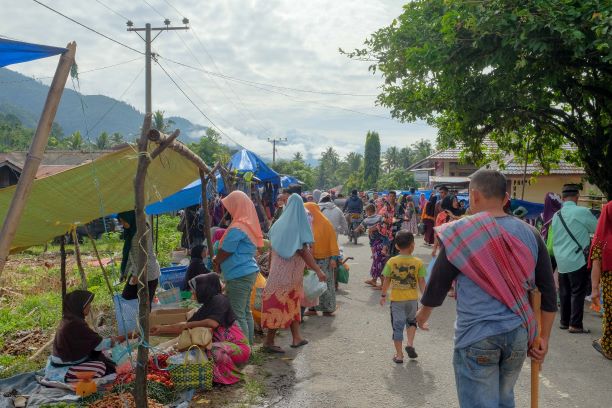
Food heaven
After many weeks of mainly consuming food in restaurants and guesthouses, my cook’s heart is jumping of joy to be able to go shopping for groceries again! Every 2 or 3 days, Putra and I were driving to the nearby bigger town of Kutacane to work and visit the market there. We buy bunches of green leaves, vegetables and fruits, most which I have never seen before. And the best thing is that all of the boys really know how to prepare delicious food! Oh my – every single one of them, with Armada and Karim leading the pack here!
After we came home with our gathered treasures, they usually immediately started to prepare dishes: in the small kitchen they cut banana flower buds and cekala, delicate small pink buds, veggies and green leaves. Fish is watered, chicken is marinated, tofu is fried and mixed in a spicy sauce. They peel and open coconuts, put the coconut meat in the blender, add water and so produce fresh coconut milk. They pull a plant out of the ground in a garden, dig for some roots and bulbs, put the plant back into its place before they cut or grind the spices. Family of ginger, but not ginger is the inconclusive information when I ask what it is. I suspect it is galingale / Galgant, but I am not sure.
I tried to note down some recipes, but I know I will never manage to prepare them even near to the taste they did – due to the simple fact that I can never get ingredients of that quality back home. Chicken curry with fresh lime leaves and lemongrass from the garden – incredibly good! Banana blossom curry. Water spinach. Fried tofu and tempeh in a fresh tomato sauce. With rice, of course.
More than once I could have fallen down on my knees for the surprising, superfresh and tasty meals!
At the same time, I would so much love to cook something myself. But this is difficult, because – in all friendship – they do not trust me enough to prepare food for the whole group.
Preparing and enjoying food is a serious matter for Indonesians. It’s not something where they want to risk anything. At maximum I may prepare my lunch or compose my breakfast, like Müsli with unbelievably delicious, fresh mangoes and soy milk. But as soon as I start cuttting the pineapple or a pink dragon fruit one of the boys is at my side and tells me how to do it correctly. And most of the time, they are right! The pineapple pieces were too big for the pancake, was Speedy’s polite comment, after he had fixed my culinary faux-pas. Jemana takes the knife out of my hand and shows me how to peel a dragon fruit without messing around.
But when we come to serious stuff, like cooking rice, o my goodness! This is not something for amateurs! Rice needs to be prepared properly and this cannot be put into the hand of strangers like that!
And this to me – aaaahhh! In my life I have received several marriage proposals for my creative cooking and now that! This something that I will need to discuss with a good therapist once I am back home ….
In Indonesia everybody loves to eat, and food is always shared. However, it is not like in Europe, where everybody then gathers around the table and enjoys a meal together. It’s rather that food is prepared in larger amounts, a big pot of rice is cooked, and whoever is here and hungry, takes a plate, sits down and munches today’s special. Insofar it happened again and again that I was sitting at the table and eating all by myself among many other people being present. This is a daily noticeable cultural difference, which I personally don’t find very comforting – but that’s how it is.
In an effort to assimilate, I meanwhile eat by using the fingers of my right hand, or let’s say – I try to do so. It works by and large, but if you have not learnt this from early childhood on, it’s a challenge. I succeed in collecting the small rice grains plus veggies and sauce from the plate and transport them somehow into my mouth, but I would rather not want to know how this looks like. It tastes very good tough and is a special, sensual way of focusing on eating.
A big thanks goes to Armada here, who showed me the decisive trick, it works much better now 😊
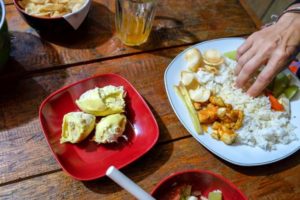
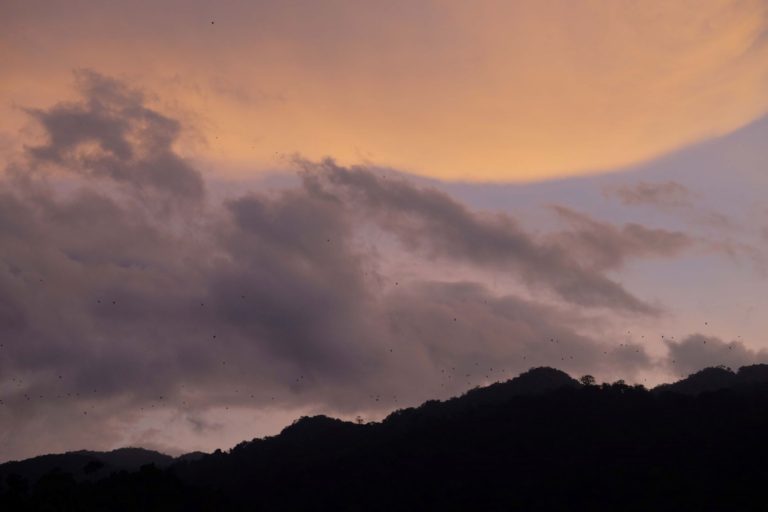
Get me out of here!
Directly after I had arrived in Ketambe we went on a 4-day trekking tour into the jungle, which was a great and intense experience again, especially now in the rainy season. However, after these days things changed. I had to find my way and my place in the guesthouse, in Ketambe. I had to find my way to level 2 and seriously bumped my nose.
Before coming here, I was not sure how long I would stay, which is why I had booked a flexible return flight, which I could easily change at any time. I did not know what was expecting me.
It was only 2 or 3 days after our trekking tour when I wanted nothing else but to get out of the situation here, to change my flight back to KL to the earliest possible date. I was lonely, insecure and had the feeling of being in solitary confinement, Einzelhaft.
I was sitting on my veranda or in my room, doing something on my own, while a group of people was chatting in the restaurant. Sometimes I was also sitting with them, but of course they were talking Gayo, their local dialect. I had no idea what they are talking about, was sitting quietly, playing around with the photos on my laptop, reading or just trying to attract the attention of one of the shy cats. Unfortunately, my best cat friend Kukis was often roaming the neighbourhood and could not help me to ease my loneliness. It was not pleasant.
I was lonely among people. I desperately missed the company of my close friends at home. I wanted to go deeper down in relevant conversations, talk about the heart of matters, ping pong and sort circling thoughts. I missed the exchanges that sharpen yet unexpressed questions, that move vague thoughts quickly to the next level. I missed it like hell. I was alone with most of my thoughts and my feelings.
Of course I was chatting with my people here, though not too much, but many things I felt I could not even touch upon with them – too many cultural differences, age differences, religion and consequently many don’t-even-dare-to-question-it areas, in addition to language barriers.
I was thankful for every other traveller that was around – but these were only a handful due to the low season. I was thankful for any contact with people in my cultural comfort zone. And I noticed quite worriedly that I started panicking when they left. Please don’t leave me all alone here.
Sorry, no Connection
What severely aggravated the situation, was the fact that we had practically no WiFi connection in Ketambe. The cell tower was out of order and I think it has not been fixed until now. This meant that also the opportunities to at least temporarily and mentally get out of the situation, were cut off. The boys went to a hill, which I named ‘Connection Hill’ soon, for their nightly chats, and could get some bad signal every now and then, but this did not help for me.
I was on my own, with no connection to my Western culture mothership. Potentially an interesting, psychological experiment, with a lot to learn and develop, but no big fun in the moment itself.
When things like these happen, you know it starts getting interesting – this was the pain point, this was the edge of my comfort zone. What would happen beyond this border?
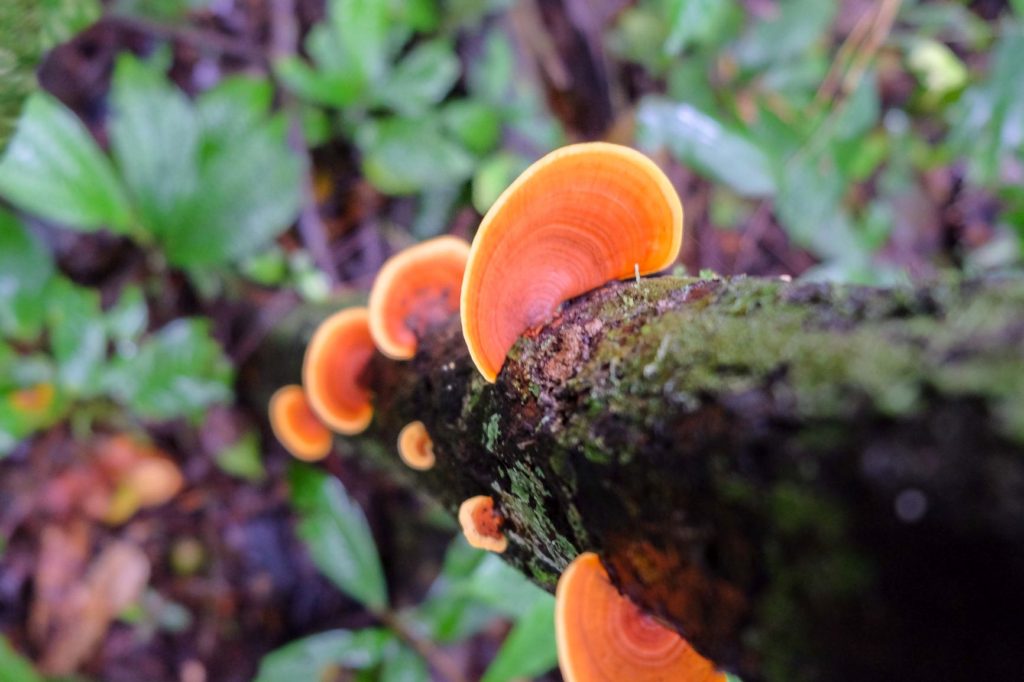
Clarifications
This was the point when my friend Putra and I had our first big culture clash discussion. How much can you expect someone to help you find your way in a different environment and culture? What can you expect from a friend from a different cultural setting in this situation? One thing was clear afterwards: this was an Austrian-Indonesian friendship, and not an Austrian one or Indonesian one. There were no existing rules for this, so we had to sort this out by ourselves. Nothing was resolved, but the cards were on the table, the pressure was gone, and this was good.
I still had nobody to reflect about my process, but it was apparent and outspoken that running away now would not be a solution, and also discomfortable for my hosts, who wanted me to have a good time here.
Running away in general is not an Indonesian concept. It’s a Western concept, in a society, where many of us live and can survive on their own. At least, we pretend that this is possible. This is not a real option here, you go through situations, you tough things out, but you just don’t run away easily.
And surely by pure chance, there was no option to go to Kutacane in the next days, so that unfortunately there was no opportunity for WiFi access and to change my flight.
Cacao & lemongrass
What happened instead in the next days, was that things were arranged for me. I had mentioned by the way that I would be interested in seeing Jemana’s lemon grass plantation and the distillery. So, next day’s programme was a small hiking tour up there. I felt a bit like a tourist again – Tour B, lemon grass distillery – but I was also very happy about this.
We were hiking up a steep path through small banana and cacao plantations, which belonged to local farmers. Very soon a breathtaking view over the green jungle hills and the broad Alas river banks opened up. It was not only soothing to my eyes, but for all senses and my soul. The Ketambe area and adjacent Gunung Leuser National Park is just incredibly beautiful!
We took a break in the shade of a small hut, where some cousins were working and Jemana opened a fresh cacao fruit with his machete – an inevitable tool hanging around the waist of every Ketambe man’s waist as soon as they leave the nearer surroundings. For the first time in my life I tasted fresh cacao beans. …. What a surprise! The single cacao beans itself are covered in a soft white pulp, I carefully separated them with sticky fingers and could barely stop to eat! What an enormously complex explosion and texture of flavours! Wow!
Learning & working
One thing that was decisive in making me stay was the fact that I could really learn very well on my veranda in this lush green, wonderful garden. I had been struggling in doing so in various setups before, but the calm garden and forest, the pleasant temperatures, the chicken and cats between the flowers and trees were the perfect surrounding to concentrate and finally make some good progress in my studies.
Not only did I start to learn again, but I was also working with Putra to set up his website for his jungle tours and the guesthouse. We had some intense working sessions, where I was also trying to convince this talented, fast-minded young entrepreneur
- to keep up concentration while I was setting up the site architecture with him despite very slow WiFi speed in Mbak Pia restaurant in Kutacane
- that annoying things as copyright and privacy are important, even if this is still seen quite a bit more relaxed in Indonesia, plus
- to please stop chatting and downloading music as long as he was hotspotting me …
Haha!! Needless to say, that I was only moderately successful in all three aspects, but I still enjoyed working creatively and seriously on a project with visible progress very much and we finalized this joint venture very successfully in the end.
P.S.: If you are curious about it, here’s the jungle trekking web-site.
Let it be
And so the days went slowly by, and I got more and more relaxed. Probably everything was just right and OK as it was. Perhaps it was more a phase of experiencing, letting things happen and be as they are – not so much of intellectual and conceptual questioning and understanding. There would be time enough to contemplate afterwards. In general, I had the impression that it was a more quiet phase, little was happening on the outside, but so much more inside of me, below the ground, directly at my roots.
Community 3.0
The evenings were now often characterized by heavy rainfall. Sometimes we had to move the table to the middle of the small restaurant area to avoid getting wet from all sides, socks were a good option and a rain jacket was more than advisable to bridge the few meters from the restaurant to the shelter of my veranda. Despite this, more and more people were joining the place, a guitar with 5 strings was suddenly there as well, and the boys and men were sitting around and singing. Beautiful Gayo songs, often for several voices, everybody singing very well and enjoying being together.
I really liked this relaxed community. Nothing was planned, who came was there, it is also not usual to make a big ceremony out of saying Hello or Good-bye. You just pop in and sit down, or take a look and leave again.
One evening there was an engaged discussion about the political situation in various Indonesian regions – the ongoing conflicts in Papua, the relationship with central government in Java, … “Politisieren” in its best sense – this is what my grandma would have called this exchange. I was fascinated although I did only catch some words. I found this very special. In this small rural village existed a discourse culture which I miss in the currently rather hysterical and polarized political discussions in the place I call home.
On a quieter evening Armada and I were making bracelets and fixing clothes, and while doing so a long and very open dialogue developped, where we tried to find ways to understand our so very different cultural and religious contexts. An important exchange, which I seriously enjoyed!
Without noticing I was slowly sinking into this different culture. More and more I was feeling at ease, learned to navigate a bit more relaxed. The less I forced myself to understand what was happening and what I should do with it, the easier it was.
And importantly, it was not only about myself, but what was equally important was the question how my friends here, the people with whom I spent time with, felt with my presence, with my intrusion in their comfort zone. … and this is not easy to see: cultural respect and social politeness are important shields and glue in this society. I did not know, if my presence was a burden for them, if they cared at all, or if they also found some distraction and fun in having me around.
I realized, that this was an important aspect for me. I could maybe stay here for these 2 weeks for my own sake and process, but I would for instance only come back again, if there would be an explicit invitation, a clear sign that my presence in this great place would be truly welcome.
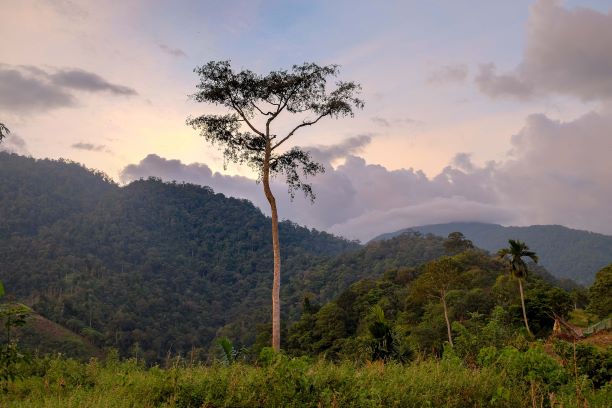
Innumerable shades of green
I have been fascinated by the rainforest itself before, but more and more I fell in love with this wonderful place and the abundant green nature all around.
I remember a moment when we were going home after one of our website sessions in town. We were late and during the 45-minutes drive it started to rain. Through the increasingly stronger rain I could see the misty green hills gently rolling down to the wide Alas river bed from both sides of the valley. The rain forest was evaporating clouds. All clothes were wet, my backpack was heavy with groceries and I was anxiously trying to hold dozens of bags with fruits and veggies in place so that they wouldn’t fall off. Seeing this scenery on the way back to the guesthouse I was one of these crazy, beautiful, happy moments, which are hard to explain, but will forever stay engraved in my soul.
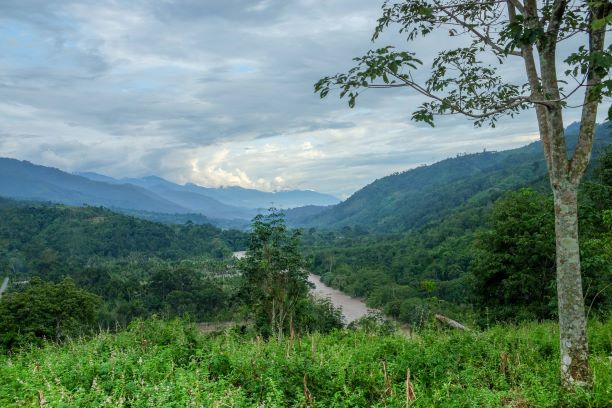
Hygiene standards assimilation – caution: potentially TMI (too much information)
As a tourist staying in Asia you will sooner or later come across different hygiene standards than at home. Bathrooms and toilets look different, and then you have two options: you can pretend to keep up European hygiene standards or you decide to gradually adapt to local habits.
After 5 months of travelling I use a blended approach here. When I’m on the road it is still vital for me to have my own toilet paper including hygienic wipes close at hand. I don’t know what locals do in bus stops for example – and frankly, I don’t want to know.
In my room in Ketambe I have a Western toilet, which is flushed with water from a bucket. As the sewage system is by far not comparable to Austrian standards, I have decided to stop using toilet paper during my second stay. This is a bit weird first, but then you quickly find out how it works best without soaking all your clothes when you wash yourself (left hand!) afterwards – haha!
I have a ‘real’ shower in my bathroom, which means spring water running down from the ceiling, but I meanwhile prefer the classical bucket shower, especially when there is only cold water available. Of course, crazy devices like hair-dryers have no raison d’etre in the jungle or most other places I stay, which requires a bit of strategic time-planning when to best wash long hair to best align this with remaining hours of sunshine.
Bare feet and mosquitos
Like in many other places in Asia – or actually in ALL real Sout-East Asian homes – it is good habit to take off your shoes when you enter a room. In the guesthouse a pile of flip flops marks the borderline, and in case someone needs to go out shortly, they just take any pair of shoes that can be reached easily. I love to go barefoot, but clean feet are a really sensitive topic for me.
The floor of a place in the middle of a jungle village, that is frequented by many people, looks only slightly better than the kitchen floor in a shared student flat back home. We cook barefoot in an intensely used kitchen and climb up and down a small ladder to access the water tap in the garden to wash hands or pots. Every night I wade through mud to my bungalow.
Meanwhile I have developed a chilled relationship with my dirty soles during the day. Interestingly before I go to bed every night they are always clean enough to crawl under my sleeping bag. And here’s my mantra: In the end it’s natural, organic dirt and probably much better than a sterile urban setting. Oooommmm….
The temporary presence of mosquitos (usually for half an hour in the morning and an hour in the evenings) still annoys me, but have I developed a certain nonchalance with it. I still put on mosquito repellents, usually a natural one with Citronella and Eucalyptus, which works very well. You just don’t have to worry too much about how your skin smells or tastes – yikes!
The magic
I observe all these trivial and more complex changes with a smile. This is probably how you get to level 2. Through insecurities, small discomforts, letting go of habits you don’t need anymore, trying out new things, remaining curious. And taking a big example in the boys here – they know very well how to operate in both worlds – perfect usage of cutlery and graceful eating with their hands. Now get yourself together, Ma’am!
In all my ups and downs, some things remained my stable stepping stones in the river while crossing to the other shore:
I felt so much comfortable in my small wooden bungalow, I loved the two windows, which opened into nothing but pure nature and sunshine outside. I just love thiw place of the Orangutan guesthouse, it has a very special positive energy.
I love Kukis and the 2 other new funny cats – one of them being sill a tiny, sleeky and shy baby. During my time there I saw the little cat girl grow, and she more and more imitated her big uncle Kukis. And he – as all good cat uncles do – accepted her at his side, shared his food and demonstrated her what she critically needed to know about a cat’s life in the jungle. The kitty, I named her Rumpelstilzchen (she did not have a name because she officially belonged to the neighbours, although she was sleeping and staying around the guesthouse all day long), remained very shy, but sometimes I could catch her and snuggle her up in one of my T-shirts.
I absobloodylutely love all the fruits and veggies in the region – if I had a more poetic vein, I would have written a sonnet about the taste of the fresh, sweet and maliciously sensuous mangoes, theses cacao fruits, the green leaves or ferns in all shapes, the papaya, which was both ever so soft and strong in its texture – refreshing, surprising and far from any soapy taste. It is incredible how all the stuff tastes here. This is how fresh fruits CAN taste! Most of the fresh stuff will be my upper calibration line for the future, and this might well be a key reason to return to the region one time. Nothing compares to this.
Durian hunt
It is not very difficult to love the taste of Asian food. But there is one highly controversial topic – the Durian. Most Europeans who have tasted Durians can hardly understand the fascination Asians have for this fruit.
Durian is not something you buy, it is something you hunt for. Comparable to mushrooms in Austria – ask my mum if she would ever buy Steinpilze in the supermarket hihi. And Durian was in season in Ketambe when I was there!
The big and heavy fruits with strong spikes fall from the trees when they are ripe, and for some strange reason mostly during darkness. Even from quite some distance you can hear a dull BUKK, when they hit the ground. This is the moment when everyone gets nervous, headlamps are being put on, search troops are starting their scooters, durian venturers swarm into the dark, the treasure hunt is open.
After a while they come back with misty-eyed faces, holding a precious durian like a new-born baby in their hands. The hard fruit is opened immediately with the machete while squatting in front of the gazebo or on the kitchen floor. Not many words are needed, the bulbs are carefully removed and shared with each other.
The Durian is the queen of all fruits, everyone who gets a piece is in 7th heaven. On some evenings some people were just hanging around the guesthouse, because there were Durian trees all around and you could hear the fruit detonations very well from our place.
I am curious for all food. And I want to understand why Asians are so mad about them. So, yes, I taste them. Every time I am being offered one, I taste it. The taste is very, very strange to middle European taste buds, to say the least. Until now I have always eaten one of the bulbs, but mostly it smelled too much like onion, was too mucous, also too sweet, too intense – but slowly I get used to this mad mélange and start to taste the differences between the individual fruits.
Then there was one fruit, which made the difference. Which got me to the point where I start to understand this folly. It was not as sweet and sticky, it still had this very distinct odeur, but then there was this very special, nearly silky-velvety, soft taste, a very own texture, a superfine creamy taste – which resembled – and I know this sounds mad now – a bit like well crafted, aged champagne. Absolutely crazy. I took a second bulb. More and more I can understand this durian-craziness.
Which is obviously also a good sign, that my assimilation here is progressing well. 😊
The key to happiness
Again and again I had asked Putra over past days, if I could borrow one of the scooters. The answer was always something like Yaaah, but ….
I wanted to go around a bit on my own and have the option to stop every 170 meters to take a picture. This passion of mine has already driven some previous boyfriends nearly half-mad, and I don’t want to annoy people with it anymore. I just want to do my thing here. It is also often hard to understand for someone else, from where exactly you want to take a photo and then you have to run back and forth some hundred meters, which only worsens the situation.
Which is why …. I wanted to go around a bit on my own.
It was the day before my departure, when I caught Armada, who had just returned to the guesthouse with the white Honda, and I said to myself: Now or never! …Ya, why not? Of course I could have the bike. Hey, great! But – how unfortunate! As I returned with my packed bag, the key could not be found anymore. Karim had it last. The whole restaurant was turned upside down. No, actually Armada had it last… Where did you put the key? … Really, I put it on the table… Or maybe in the kitchen? The boys do not need a key, they can start and drive the bike with the help of a spoon, but me? No. In the middle of the whole search Putra returned from connection hill and was all but amused about what was going on. Why I wanted to go on my own? The traffic is crazy here. You can’t go into Kutacane. … Ya, I know, Armada already told me. I won’t go far. … How far? … Well, near Kutacane … No, that’s too far, this is nearly 25 kilometers. 10 kilometers is ok. …. But …. No, I have never seen you driving. I feel responsible for you … I take the helmet…. No, why don’t you go with Karim? (puuuh, poor Karim, he would have hated me after the tour). I remained stubborn, I wanted to go on my own. Do we have a bicycle? … No. And anyway, the petrol is finished and we can’t open the tank without the keys…
Oh my, I felt like a 14-year old teenager, who wanted to go out on her own for the first time! The future daughters of these young men will have a hard time later. Mama was discussing with her boys, if she could drive around a bit with the bike on some calm village roads – what a hillarious situation.
In the end it was Armada, who resolved the situation. He returned from somewhere with a full tank and a 3rd set of keys. Putra’s look could have cut the air, but I was happy! What followed was a detailed briefing on how and where to look when I wanted to turn or overtake, how to drive on the left side and so forth by both of them – how sweet!
I had a great morning, the light was still good for taking pictures, and I used every minute to capture this landscape that touches my soul in such a peculiar way.
P.S.: Surprisingly, I returned safely
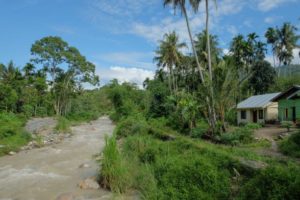
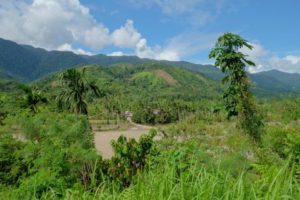
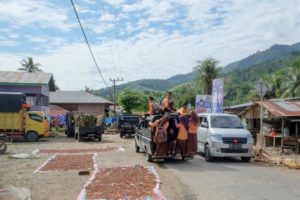
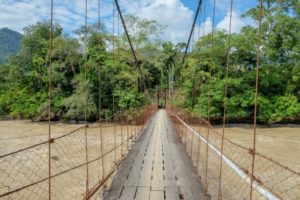
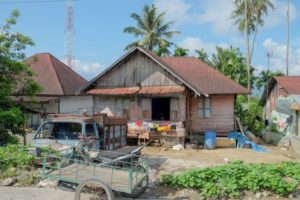
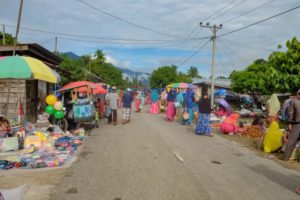
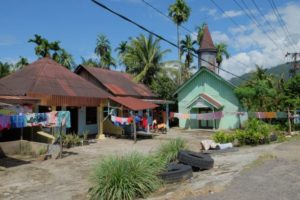
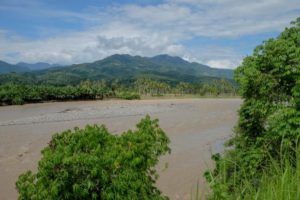
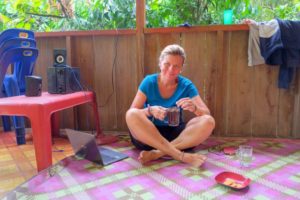
Floodings
In two areas there were again floodings from last night, but I managed to drive through the muddy water that was running over the street.
Neighbours were working together to clear the blocked feeder rivers usually flowing into Alas river from wood and trees, families were cleaning their houses from mud, laundry was hung up to dry, kids were playing in the middle of the chaos, not yet aware of the gravity of the situation. During this rainy season, practically every night a small river flooded parts of a village.
When I saw people looking for stuff in the remainders of their former houses, I remembered what I had learned about this last year: one of the main health concerns after floodings is depression. When you see this, you can understand why. People are so strong, and the community makes them stronger, but still ….
Putra told me later that the problems are mostly in the areas, where the rainforest had been cut down for seemingly more profitable business. I saw trees floating down in the high waters of Alas river later. Guess which? Yes, oil palm trees. What an irony!
Departure
It is Sunday, December 16 and I know I will be leaving Ketambe this morning after an early breakfast.
It’s a calm morning, only Putra, Karim and Martin, who has been sleeping in the restaurant area like so often – are here. I can’t talk a lot, everything has been said. I just try to inhale the sounds, the smell, the sunshine, the green leaves, the sound of my friends’ voices, the atmosphere in the guesthouse as much as I can. I can’t talk a lot, because I know I will start crying in any minute if I do.
In one of our last veranda discussions, Putra had said to me: Tina, you will always have a family here. And this is exactly how it feels. Leaving a family, leaving a place, which I called a temporary home with all its ups and downs in the past 2 weeks.
An hour later I was sitting in the back of the car with tears just running down my face. Sometimes it is just right to cry and let the tears flow. Like now that I was leaving this valley.
It’s not yet 9 o’ clock and the villages are waking up, people are already squatting on the streets, doing their morning rituals, have breakfast. Kids are playing already. Garbage is being burnt, people sit, eat and smoke in the early sunlight, which covers this landscape in ever so wonderful colors. It’s incredibly beautiful.
It hurts to go away from here. I love this place. It hurts to leave this family. What a grace that something like this is possible. It was so good to still have breakfast together this morning, for the first time everyone, who was here, was sitting at the table together. Such a blessed, sacred place. I will miss this so much, the fields, the forest, the hills.
I look into people’s faces passing by, people I don’t know but whose diverse looks have grown close to my heart in the past 2 weeks. I think I will never be able to see someone from this region without being touched. These are my people here, it’s hard to describe.
I feel incredibly blessed that I could be part of this community and that they accepted me for a while. I can’t help to compare it to the hostile environment in Europe at the moment, how strangers are welcomed, or rather not. This sense of community, this openness and being there for others is a big difference to many places in the developed world and I have discussed this in long evening sessions with Armada and Putra. They could by no means understand, how community tasks can be institutionalized in our Western world, for instance like the care for old people.
Putra had also tried to explain their sense of community to me, but it was more a passionate speech than a discussion, he did not allow a lot of objection for this topic. It is so important for them, and they are proud of it.
And, yes, they can absolutely be proud of it, because this is unique: being welcomed, being allowed to be part of a community, without big concerns and discussions. Like in every good family we had our fights and arguments. This is part of it, you clarify ideas, positions and relations. This is important, but at the same time you just belong there.
I am not sure if I have experienced this in this form already? Probably not, because I have never been so close to an Asian family. This is something so incredibly valuable and I so much wish for the Indonesian society, that they can preserve this sense of community – despite all development that is going on here and needs to happen.
And never ever do I want to hear anything about stereotypes in this region again, I do not want to hear anything about religious prejudices. Because it’s all not important. It’s this community that counts and I can meanwhile understand how people can subordinate personal needs and wishes every now and then for the community, the clan. This has an incredible value and is something I strongly take away from here. As a gift I received, but also as a big learning.
I’m crying. And it’s right and alright. In its very essence, family, friendship and a place you can call a home is something that you feel, and not something you need to understand.
I am at level 2.
